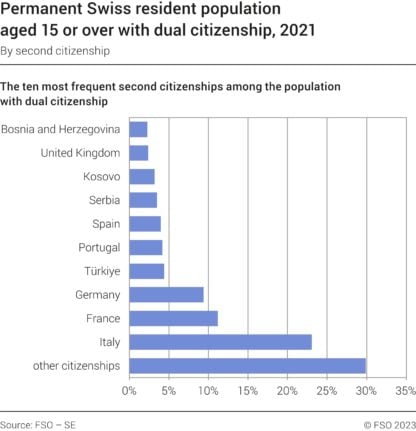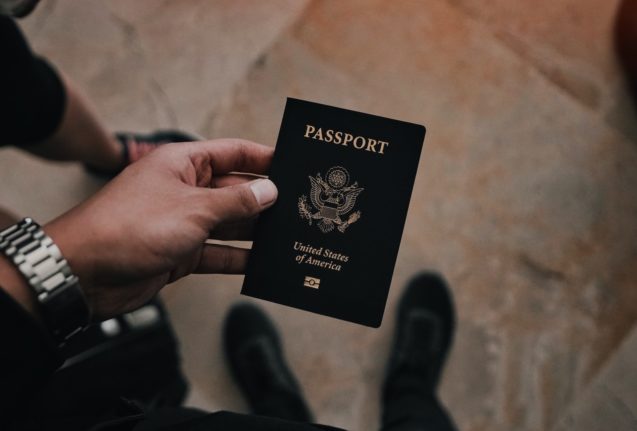Dual citizens in Switzerland: Which country's rules should you follow?

If you have two nationalities, you may be confused about which country’s laws you should follow — Switzerland’s or the other state’s. Here are some answers.
In 2021— the last year for which official figures are available — 19 percent of Switzerland’s permanent resident population aged 15 or over had dual nationality.
Dual citizens are foreigners who obtain citizenship of their country of residence while still maintaining the nationality of their place of origin.
The most common ‘first’ nationality — the one held before obtaining a Swiss passport — is Italian, followed by French and German, as most immigrants come to Switzerland from these countries.

Chart by Federal Statistical Office.
Both countries consider these people as their citizens and neither regards them as foreigners, which could sometimes cause some ‘identity crisis’ of sorts — not knowing which country’s laws apply to them.
More than half a year
For most dual nationals in Switzerland, the rules are pretty simple.
Regardless of what second citizenship they hold, if their primary, legal residence is Switzerland (which means they live here at least six months and one day a year), then Swiss laws apply.
This means that even if they still have strong ties with their home countries and spend a lot of time there, they are bound by the rules Switzerland has in place for its citizens (both by birth and naturalisation) — for instance, the requirement to have a health care insurance policy, and file and pay taxes and social contributions here.
As for the military service, having another citizenship in addition to the Swiss one is not going to exempt you from military service in Switzerland.
However, there is one exception: the obligation to serve will be waved, provided you can show that you have fulfilled your military duties in your other home country.
The American exception
There are, however, some situations, which complicate this scenario a bit — or a lot.
For example, if you are a dual Swiss-ÙS citizen, then you must continue declaring your assets and filing tax returns in that country (in addition to doing so in Switzerland as well) — even if you haven’t lived in the United States for a long time and don’t plan to ever return there.
The only way to forego this obligation is to officially relinquish your American citizenship and keep just the Swiss one, a drastic step that thousands of US nationals in Switzerland and other countries have taken.
READ ALSO: Hundreds of US citizens in Switzerland waiting to renounce citizenship
Another obligation that dual American citizens must comply with, is to use the US passport when travelling to the US.
Even if you usually travel with the Swiss passport, doing so while travelling to the United States is not permitted.
According to the US State Department, “U.S. citizens, including dual nationals, must use a U.S. passport to enter and leave the United States."

You can enter the US only with your American passport. Photo by Levi Ventura on Unsplash
What travel rules does Switzerland apply to its dual citizens?
Admittedly it is much easier to enter the country with your Swiss passport, especially if you travel by air.
That’s because you won’t have to queue up with other foreigners, especially as Zurich and Geneva airports now have automatic passport control machines for Swiss citizens.
So even though you are not breaking any laws (at least not Swiss ones), if you travel with your ‘other’ identity papers when arriving in Switzerland, presenting your country-specific passport is much simpler.
READ ALSO: What dual nationals in Switzerland should know when travelling
Living abroad
If, on the other hand, you choose to reside primarily in your country of origin and spend less than six months and a day in Switzerland, then you must comply with the laws of that country — even if you also have a Swiss passport.
You are not obligated to purchase Swiss medical insurance or pay taxes here, unless you own property in Switzerland.
Those requirements will be imposed on you by your country of residence.
One right that will remain, however, is your right to vote (from abroad) in national referendums and elections. But you won’t be able to cast a vote in cantonal or municipal ones.
Comments
See Also
In 2021— the last year for which official figures are available — 19 percent of Switzerland’s permanent resident population aged 15 or over had dual nationality.
Dual citizens are foreigners who obtain citizenship of their country of residence while still maintaining the nationality of their place of origin.
The most common ‘first’ nationality — the one held before obtaining a Swiss passport — is Italian, followed by French and German, as most immigrants come to Switzerland from these countries.

Both countries consider these people as their citizens and neither regards them as foreigners, which could sometimes cause some ‘identity crisis’ of sorts — not knowing which country’s laws apply to them.
More than half a year
For most dual nationals in Switzerland, the rules are pretty simple.
Regardless of what second citizenship they hold, if their primary, legal residence is Switzerland (which means they live here at least six months and one day a year), then Swiss laws apply.
This means that even if they still have strong ties with their home countries and spend a lot of time there, they are bound by the rules Switzerland has in place for its citizens (both by birth and naturalisation) — for instance, the requirement to have a health care insurance policy, and file and pay taxes and social contributions here.
As for the military service, having another citizenship in addition to the Swiss one is not going to exempt you from military service in Switzerland.
However, there is one exception: the obligation to serve will be waved, provided you can show that you have fulfilled your military duties in your other home country.
The American exception
There are, however, some situations, which complicate this scenario a bit — or a lot.
For example, if you are a dual Swiss-ÙS citizen, then you must continue declaring your assets and filing tax returns in that country (in addition to doing so in Switzerland as well) — even if you haven’t lived in the United States for a long time and don’t plan to ever return there.
The only way to forego this obligation is to officially relinquish your American citizenship and keep just the Swiss one, a drastic step that thousands of US nationals in Switzerland and other countries have taken.
READ ALSO: Hundreds of US citizens in Switzerland waiting to renounce citizenship
Another obligation that dual American citizens must comply with, is to use the US passport when travelling to the US.
Even if you usually travel with the Swiss passport, doing so while travelling to the United States is not permitted.
According to the US State Department, “U.S. citizens, including dual nationals, must use a U.S. passport to enter and leave the United States."

What travel rules does Switzerland apply to its dual citizens?
Admittedly it is much easier to enter the country with your Swiss passport, especially if you travel by air.
That’s because you won’t have to queue up with other foreigners, especially as Zurich and Geneva airports now have automatic passport control machines for Swiss citizens.
So even though you are not breaking any laws (at least not Swiss ones), if you travel with your ‘other’ identity papers when arriving in Switzerland, presenting your country-specific passport is much simpler.
READ ALSO: What dual nationals in Switzerland should know when travelling
Living abroad
If, on the other hand, you choose to reside primarily in your country of origin and spend less than six months and a day in Switzerland, then you must comply with the laws of that country — even if you also have a Swiss passport.
You are not obligated to purchase Swiss medical insurance or pay taxes here, unless you own property in Switzerland.
Those requirements will be imposed on you by your country of residence.
One right that will remain, however, is your right to vote (from abroad) in national referendums and elections. But you won’t be able to cast a vote in cantonal or municipal ones.
Join the conversation in our comments section below. Share your own views and experience and if you have a question or suggestion for our journalists then email us at [email protected].
Please keep comments civil, constructive and on topic – and make sure to read our terms of use before getting involved.
Please log in here to leave a comment.